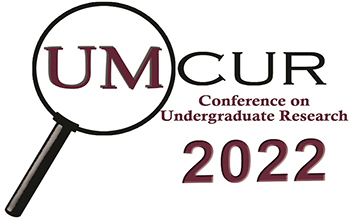Presentation Type
Poster
Faculty Mentor’s Full Name
Jenna Griffin
Faculty Mentor’s Department
School of Speech-Language Hearing and Occupational Sciences
Abstract / Artist's Statement
Title: Caregiver Outcomes in the Context of Telehealth and In-Person Applications of an Intensive Comprehension Aphasia Program.
Purpose: The purpose of this study is to explore perceived stress for caregivers of stroke survivors with aphasia who participated in telehealth and in-person delivery models of a high-intensity, short duration stroke rehabilitation program, as measured by the Perceived Stress Scale (PSS; Cohen et al., 1983).
Method: During in-person Intensive Comprehensive Aphasia Programs (ICAPs; Rose et al., 2013; 2021) in 2017 and 2018, and a tele-health ICAP in 2020, caregiver-reported outcomes were assessed using the PSS, a measure of perceived stress across life situations. During the ICAP intervention, caregivers participated in psychoeducation sessions, group counseling sessions, and individualized communication skill and strategy use training sessions. Interventions were delivered by a family counselor and speech-language pathologists. The PSS was administered before the caregivers began the ICAP and again after its completion (n=13 for in-person pre-ICAP, n=12 for in-person post-ICAP; n=3 for telehealth ICAP). PSS outcomes data will be analyzed using descriptive statistics to assess and interpret change scores. PSS item analyses will be conducted to assess the influence of item on pre/post change.
Significance: Caregivers play a significant role during rehabilitation for stroke survivors with aphasia (i.e., a communication and language disorder). Caregivers are involved in supporting aphasia rehabilitation outside of clinical settings and are responsible for the patient’s overall wellbeing. Caregivers frequently experience third-party disability, including high levels of stress and isolation (Grawburg et al., 2013, Off et al., 2019). Caregivers should be considered as part of the treatment team as their wellbeing is intertwined with the stroke survivor’s wellbeing. This study is multifaceted: (1) it explores the changes of perceived stress for caregivers of stroke survivors with aphasia, and (2) it investigates the impact of delivery methods (i.e., in-person and telehealth) on changes of perceived stress. This study has the potential to contribute to the limited research based regarding caregiver health.
References
Cohen, S., Kamarck, T., & Mermelstein, R. (1983). Perceived Stress Scale. APA PsycTests.
Grawburg, M., Howe, T., Worrall, L., Scarinci, N. (2013). Third party disability in family members of people with aphasia: A systematic review. Disability and Rehabilitation,35(16), 1324-1341.
Off, C.A., Griffin, J.R., Murray, K.W., & Milman, L. Interprofessional Caregiver Education, Training, and Wellness in the Context of a Cohort Model for Aphasia Rehabilitation Top Language Disorders, 39(1), 5–28.
Rose, M., Cherney, L., & Worrall, L. (2013). Intensive comprehensive aphasia programs: An international survey of practice. Topics in stroke rehabilitation, 20(5), 379-387.
Rose ML, Pierce JE, Scharp VL, Off CA, Babbitt EM, Griffin-Musick JR, Cherney LR. (2021). Developments in the application of Intensive Comprehensive Aphasia Programs: an international survey of practice. Disability and Rehabilitation (10), 1-15. doi: 10.1080/09638288.2021.1948621.
Category
Social Sciences
Caregiver Outcomes in the Context of Telehealth and In-Person Applications of an Intensive Comprehension Aphasia Program
UC South Ballroom
Title: Caregiver Outcomes in the Context of Telehealth and In-Person Applications of an Intensive Comprehension Aphasia Program.
Purpose: The purpose of this study is to explore perceived stress for caregivers of stroke survivors with aphasia who participated in telehealth and in-person delivery models of a high-intensity, short duration stroke rehabilitation program, as measured by the Perceived Stress Scale (PSS; Cohen et al., 1983).
Method: During in-person Intensive Comprehensive Aphasia Programs (ICAPs; Rose et al., 2013; 2021) in 2017 and 2018, and a tele-health ICAP in 2020, caregiver-reported outcomes were assessed using the PSS, a measure of perceived stress across life situations. During the ICAP intervention, caregivers participated in psychoeducation sessions, group counseling sessions, and individualized communication skill and strategy use training sessions. Interventions were delivered by a family counselor and speech-language pathologists. The PSS was administered before the caregivers began the ICAP and again after its completion (n=13 for in-person pre-ICAP, n=12 for in-person post-ICAP; n=3 for telehealth ICAP). PSS outcomes data will be analyzed using descriptive statistics to assess and interpret change scores. PSS item analyses will be conducted to assess the influence of item on pre/post change.
Significance: Caregivers play a significant role during rehabilitation for stroke survivors with aphasia (i.e., a communication and language disorder). Caregivers are involved in supporting aphasia rehabilitation outside of clinical settings and are responsible for the patient’s overall wellbeing. Caregivers frequently experience third-party disability, including high levels of stress and isolation (Grawburg et al., 2013, Off et al., 2019). Caregivers should be considered as part of the treatment team as their wellbeing is intertwined with the stroke survivor’s wellbeing. This study is multifaceted: (1) it explores the changes of perceived stress for caregivers of stroke survivors with aphasia, and (2) it investigates the impact of delivery methods (i.e., in-person and telehealth) on changes of perceived stress. This study has the potential to contribute to the limited research based regarding caregiver health.
References
Cohen, S., Kamarck, T., & Mermelstein, R. (1983). Perceived Stress Scale. APA PsycTests.
Grawburg, M., Howe, T., Worrall, L., Scarinci, N. (2013). Third party disability in family members of people with aphasia: A systematic review. Disability and Rehabilitation,35(16), 1324-1341.
Off, C.A., Griffin, J.R., Murray, K.W., & Milman, L. Interprofessional Caregiver Education, Training, and Wellness in the Context of a Cohort Model for Aphasia Rehabilitation Top Language Disorders, 39(1), 5–28.
Rose, M., Cherney, L., & Worrall, L. (2013). Intensive comprehensive aphasia programs: An international survey of practice. Topics in stroke rehabilitation, 20(5), 379-387.
Rose ML, Pierce JE, Scharp VL, Off CA, Babbitt EM, Griffin-Musick JR, Cherney LR. (2021). Developments in the application of Intensive Comprehensive Aphasia Programs: an international survey of practice. Disability and Rehabilitation (10), 1-15. doi: 10.1080/09638288.2021.1948621.
